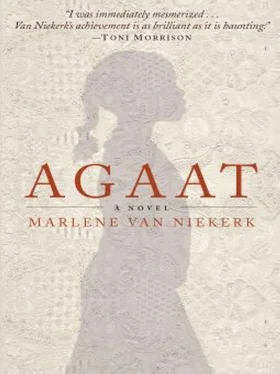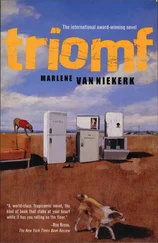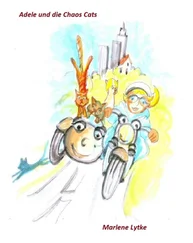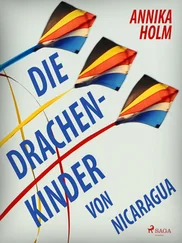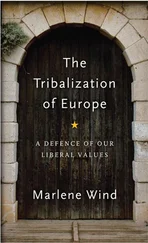She was sounding the words. I peeped through the chink of the kitchen door. The plastic case and the white bag had been unpacked. Papers and brochures were spread out on the kitchen table. Agaat was studying my illness over her supper. On her hands were two grey palm socks to which a clumsy knife and a fork with three prongs had been fixed.
Spas-ti-ci-ty, she read on the table next to her plate, wrist pains, cramps, spasms, as-piration, depression.
Slowly she spelled out the big words: Movement spec-trum exercise. Mo-di-fied food con-sis-ten-cy.
And in the same breath she said, I’ve finished eating, you can come out now from behind the door, we might as well get to work on this, you and I.
You and I. Indeed. We’re still getting to work, if work is what one can call what has been happening in this room the past few months.
One could have decided not even to get started on it.
Because it would be too much.
I would have had to settle it on my own while I could still move, that’s what. Short and sweet. But I procrastinated every time. Just this first, just that first, must first clear up, first get my life in order before I put an end to it one day neatly tied up with a string. But I couldn’t.
I left the decision to her.
Euthanasia isn’t something that she can even consult me on any more.
Such a possibility doesn’t appear on her list.
How would she in any case have to formulate it?
Must I put an end to you?
Are you ready?
How do you want me to prepare you?
Or must I overpower you unexpectedly?
Do you want to know how I’m going to do it?
Do you want to choose the method yourself?
A pillow over your head? A drink? A pill? A crowbar? A knife?
She’ll never be able to say it. She chose the strait and narrow. Simply doing from hour to hour what was given to her hand to do. First things first, one thing at a time, according to a plan. As if it made sense, as if it held promise.
Why does she ignite the little bit of hope in me every day? Hope of a turn, a way out, a satisfactory conclusion, of which you could say with certainty that it was good?
I find that on some days I long for it more than on other days.
I heard the phone ringing early this morning. It was Leroux.
She was short with him.
Perhaps he had been hopeful. Because, no, she said, she’s still with us, and well. Well, well, well. I understand. I’ll do that. Right. Goodbye doctor. Yes, doctor. No, doctor. Goodbye.
And now she thinks I’m sleeping again after drinking my thick sweet tea with the bit of chilli powder that she believes is good for me. I heard her send the servants home. She wiped my face quickly this morning and beyond that did not touch me, as if she were suddenly scared that I might fall apart. I tried to reassure her.
Thank you, I feel better after the phlegm is out, lighter, I breathe more easily.
But she avoided my eyes, didn’t want to help me speak, knew it was just to comfort her.
I can’t help her.
Twice already I’ve heard her pick up the receiver and put it down again. She wants to phone. I wait. What does Agaat want to say? Whom does she want to phone?
She phones often, the chemist, the co-op, the shop. Orders things, organises things. And people phone here and she speaks to them and tells them, according to who is phoning, more or less. Rather less, more less, less and less. Platitudes. Truisms. The chickens are laying well, the harvest is almost in, her feet are cold sometimes. When she says that, they ring off quickly. People don’t want to hear about my ever more chilly feet.
If it’s Jakkie, she speaks loudly on purpose, repeats everything he says. About his research amongst primitive tribes, his travels. He gets to all of Africa, it seems, just not South Africa. Here he apparently only wants fieldworkers. Agents it sounds like, who listen to songs and send them on to him. To then be preserved in the Canadian Centre for Ethnomusicology. It seems to her Americans have money to waste, says Agaat.
Jakkie.
Sometimes I think she makes it up, that he rings, that he asks after me, that he says he will come.
But how would I know?
My child the great absence.
What he inherited from me and Jak is definitely recognisable. Slightly melancholy, sometimes quite sharp with his tongue. Agaat one hears most clearly in him. The sayings, the songs, the rhymes, in which he has an obsessive interest. Sometimes she sings something on the phone for him if he can’t remember the words any more.
The bottom of the bottle.
The Sunday morning.
Ai, the ordinary little old songs, and then he did have such a beautiful voice, the child. Would it be him that she wants to ring? A last chance to come?
When he wrote to say he was starting to study all over again, I wrote back saying but surely there’s a department of Afrikaans cultural history at Stellenbosch, isn’t there? And then in his next letter he delivered himself of a whole lot of stuff about how he wasn’t a Patriomanic Oxwagonologist, but an anthropologist, and that meant that it was the rubbish bins of the worthy professorial Brethren of Stellenbosch, not their ideas, that he had to scrutinise under a magnifying glass. The ideas, he wrote, spoke for themselves, they flared to high heaven like pillars of fire in the desert, they couldn’t be missed by a deaf-and-dumb dog with a blocked nose.
It upset me, that the child could now turn so sharply against his own people. Being radical surely didn’t oblige you to become disrespectful. It wouldn’t have been wise of me to react at that stage. Those were his refractory years. Not that he ever fitted in altogether. Even as a child always half-apart, never really interested in his peers, tied to Agaat’s apron strings here on the farm. Later, too, not much time or taste for the antics of his fellow-students or for the other officers in the Defence Force. Herd animals, he said, always had to have a bell-wether and a scapegoat, without those they couldn’t function.
Nowadays he sounds more concerned. Not about the headline news, he writes, but about ‘the little grey bushes’, whatever that’s supposed to mean. Surely one can’t live with so little faith in the world?
He writes but rarely. When he writes to Agaat, she no longer shows it to me. Not that she ever really showed his letters, she just read out from them, quoted what she wanted to.
There was just the one letter, the one that she had to show us, Jak and me, the first one after he vanished. Of that I saw only the first line. And when I saw it again, it was so besmeared with blood that the pages were stuck together.
She would supposedly still read it to me. Nothing came of that. More than a year later only did Jakkie report on everything. Rather synoptically. No reference to that first confession and plea.
Did we bring him up wrongly?
Can’t have been too wrongly, for he has a job and a house and a will of his own.
It’s Agaat who’s been most badly hurt. She pines for him, I can see it, when she gazes out of the door in a certain way and closes her eyes for a moment, or, sometimes at night, when the doors here are thrown open and she lowers her embroidery and turns her head askance to listen, her cap tilted at an angle like a radar dish.
Does she want to phone him this morning? Perhaps she’s struggling with the dialling codes for overseas. Perhaps she wants to pretend to be phoning him, for my sake. Perhaps she’s trying to think what she’d better say then, how she should say it, for the benefit of my listening ears.
But I know what her face looks like when she thinks she’s going to be talking to Jakkie.
Perhaps it’s the undertaker, rather, that she wants to phone. For a preview. Perhaps she hopes that it will encourage me, such a quantity surveyor’s assessment. Just as well that I’ve been deprived of speech.
Читать дальше
